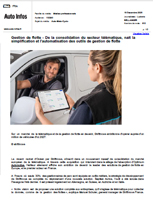Source: Car Fleets
Journalist: Frédéric Blin
Edition: June 2024 — Page 47
Periodicity: Monthly
Audience: 74,000 readers
Sector: Auto-Moto-Cyclo
Artificial intelligence\ With the fleet management as in all fields, tool publishers use artificial intelligence to facilitate the task of fleet managers. But beyond functionalities presented as innovative, artificial intelligence is also justified by its contribution to the processing of an ever increasing number of data.
“Our raison d'être is to help our customers find their way around the ever-increasing mass of data that our tool collects on a daily basis. Our project is to provide fleet managers with access to business intelligence and “data lake” tools, in order to help them visualize certain essential data. And to do this, we are going to rely more and more on artificial intelligence and algorithms,” explains Géraud Portu, managing director of GAC Technology, the publisher of the GAC CarFleet software.
As a reminder, a data lake brings together a set of data specific to a company. From this source of information, organized or not, artificial intelligence draws on to provide targeted answers.
Improving data collection and reliability
Beyond simple indicators, artificial intelligence also improves the collection of data, especially those relating to mileages. This data, which is essential to fleet management, is not always reliable, especially when entered by drivers.
“Artificial intelligence allows us to identify incoherent or probably false kilometer readings, and to replace them with a corrected value,” says Géraud Porteu.
For its part, Optixt, publisher of the software of fleet management Winflotte, is following the same path: “We have developed the use of artificial intelligence, or rather algorithms, to correct errors made by drivers when entering their statements when taking fuel. The reliability of this data is essential in order to then make projections on the traffic laws that are foreseeable for the various drivers,” says Pascal Merle, Sales Director at Optixt.
Artificial intelligence to assess electrification potential
This accurate mileage data is also crucial for another indicator that many are now developing: the electrification potential of vehicles.
“In order to assess the electrifiable vehicles in the fleet, a lot of data must be taken into account. This is a simple operation for a small fleet, but in the case of a large park, algorithms can help sort through essential data,” underlines Géraud Porteu.
A help tool, not a substitute for a manager
However, while publishers systematically use artificial intelligence, it does not replace human managers.
“Our approach is to save time and not to take the place of men. These robots will be able to answer basic questions, but above all to free up time for fleet managers. These managers will then be able to focus on more complex issues related to the operation of their fleet, such as the choice of new models, or the interaction with drivers who still prefer human contact,” insists Géraud Porteu.
Human contact remains essential
This position is confirmed by Cyril Englert, fleet manager at Pharmafield, a service company for pharmaceutical laboratories.
“Human contact remains important: drivers continue to make phone calls to ask questions, even if they have the answers in the various media available to them,” he observes.
Cyril Englert adds: “The commissioning of our software for fleet management did not prevent the hiring of a dedicated assistant, in particular to respond to requests from drivers. And sometimes she, too, takes her phone to ask the software publisher's support services for information on how the software works.”
Asking questions to the tool: the rise of chatbots in fleet management
Artificial intelligence at the service of fleet managers
Another notable evolution linked to artificial intelligence is the appearance of “chatbots”, these virtual assistants designed to support managers in their daily lives. Thanks to these interfaces, fleet managers can now ask questions in natural language about managing their fleet.
Simple questions for accurate answers
“Today, a manager can ask questions in a natural way, for example by questioning his software to find out which vehicles are relevant to renew according to use, maintenance costs, etc.”, explains Daniel Vassallucci, managing director of the telematics company and publisher of tools for fleet management Optimum Automotive.
This service is accessible via a Add-on (additional module) offered for an additional cost of 1 to 1.50 euros.
Intelligent data processing in a” Data hub ”
At Optimum Automotive, artificial intelligence is widely used to analyze all the data collected in the” Data hub ” of the provider. Ce Data hub centralizes various information such as:
- data from the embedded boxes (mileages, alerts engine, consumption, geolocation),
- contractual data,
- invoices from fleet service providers (rental companies, maintenance shops).
This consolidation allows the chatbot to provide precise answers adapted to the needs of managers.
Frédéric Blin
#gestion_de_flotte, #géolocalisation, #alertes, #data_hub, #IA








